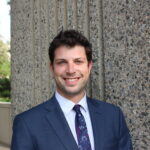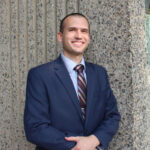At most American law schools, serving on the school’s law review is a defining experience for those students who successfully earn a spot as staff editor – and even more so for those who go on to roles on the editorial board. However, for those students who attend law school at night, these opportunities are often out of reach. The editorial board for Volume 92 of the Temple Law Review includes six evening division students, five of whom were able to share their thoughts on the experience with the Temple Law newsroom.
 Brittany Clarke, a rising 3LE, is the Editor-in-Chief of the Temple Law Review. In that role, she is the main point of contact for outside professors. Brittany, along with the Executive Editor, is the first and last line of editing for everything that will be published in Volume 92 of Temple Law Review. For the past five years, she has worked as a middle school teacher in North Philadelphia. However, after summer school ends in August, Brittany will be hanging up her teaching hat to focus on her editorial board responsibilities – and her impending August 2019 nuptials. Her goals while serving as Editor-in-Chief include further developing TLR’s accessibility to part-time students; continuing efforts to increase TLR’s diversity including both scholarship and staff; and increasing TLR’s engagement in Temple’s community.
Brittany Clarke, a rising 3LE, is the Editor-in-Chief of the Temple Law Review. In that role, she is the main point of contact for outside professors. Brittany, along with the Executive Editor, is the first and last line of editing for everything that will be published in Volume 92 of Temple Law Review. For the past five years, she has worked as a middle school teacher in North Philadelphia. However, after summer school ends in August, Brittany will be hanging up her teaching hat to focus on her editorial board responsibilities – and her impending August 2019 nuptials. Her goals while serving as Editor-in-Chief include further developing TLR’s accessibility to part-time students; continuing efforts to increase TLR’s diversity including both scholarship and staff; and increasing TLR’s engagement in Temple’s community.
 Alison Slaughter is a rising 3LE and the Lead Articles Editor. In that role, she works with the Articles Editors to select the articles that will be published in Temple Law Review and serves as a point of contact for the authors. She also works full-time as a patent agent for a boutique intellectual property law firm. Alison decided to serve on Temple Law Review’s editorial board because she wanted to continue to grow Temple Law Review’s academic presence and excellence. Alison specifically chose to apply for the Lead Articles Editor position because it provided the opportunity to read many articles from accomplished scholars in all areas of the law.
Alison Slaughter is a rising 3LE and the Lead Articles Editor. In that role, she works with the Articles Editors to select the articles that will be published in Temple Law Review and serves as a point of contact for the authors. She also works full-time as a patent agent for a boutique intellectual property law firm. Alison decided to serve on Temple Law Review’s editorial board because she wanted to continue to grow Temple Law Review’s academic presence and excellence. Alison specifically chose to apply for the Lead Articles Editor position because it provided the opportunity to read many articles from accomplished scholars in all areas of the law.
 Nancy Fisher, a rising 3LE, is one of four Articles Editors and one of two Symposium Editors. As Articles Editor, Nancy works with a team to evaluate submissions from outside authors to TLR. As Symposium Editor, she works with a partner to plan the 2019 Temple Law Review Symposium, which takes place in late October. Nancy and her partner work with a faculty advisor to pick a topic, invite speakers, plan the logistics of the day-long event, and manage everything else that goes into putting an event together. She also works full time as a case-assistant at a local firm; is involved in LALSA and TELS; is an active alumna of Lambda Theta Alpha Latin Sorority, Inc.; and fits in family and fitness when she can.
Nancy Fisher, a rising 3LE, is one of four Articles Editors and one of two Symposium Editors. As Articles Editor, Nancy works with a team to evaluate submissions from outside authors to TLR. As Symposium Editor, she works with a partner to plan the 2019 Temple Law Review Symposium, which takes place in late October. Nancy and her partner work with a faculty advisor to pick a topic, invite speakers, plan the logistics of the day-long event, and manage everything else that goes into putting an event together. She also works full time as a case-assistant at a local firm; is involved in LALSA and TELS; is an active alumna of Lambda Theta Alpha Latin Sorority, Inc.; and fits in family and fitness when she can.
 Jeremy Gradwohl is a rising 3LE and one of five Research Editors. In that role, he goes back-and-forth with staff editors, the editor-in-chief, and the executive editor to oversee and incorporate revisions to TLR publications. He is also a full-time constituent services representative for Philadelphia City Council President Darrell Clarke, assisting residents of the Council President’s district in their efforts to redress quality-of-life issues and navigate City programs and services. He was inspired to serve on the editorial board by the promise of exposure to new ideas in the law as well as a fresh variety of different writing and editorial styles.
Jeremy Gradwohl is a rising 3LE and one of five Research Editors. In that role, he goes back-and-forth with staff editors, the editor-in-chief, and the executive editor to oversee and incorporate revisions to TLR publications. He is also a full-time constituent services representative for Philadelphia City Council President Darrell Clarke, assisting residents of the Council President’s district in their efforts to redress quality-of-life issues and navigate City programs and services. He was inspired to serve on the editorial board by the promise of exposure to new ideas in the law as well as a fresh variety of different writing and editorial styles.
 Michael DeAngelo is a rising 4LE and one of four Note/Comment Editors. In that role, Michael works with a group of Staff Editors, guiding them through the process of writing their Note or Comment. He is also a husband, a father, and a trooper with the Pennsylvania State Police. Michael was able to draw on his decade of experience in law enforcement to identify, research, and write his Comment, and notes that if all of his evening division classmates did the same, they would produce a law review volume of astounding breadth.
Michael DeAngelo is a rising 4LE and one of four Note/Comment Editors. In that role, Michael works with a group of Staff Editors, guiding them through the process of writing their Note or Comment. He is also a husband, a father, and a trooper with the Pennsylvania State Police. Michael was able to draw on his decade of experience in law enforcement to identify, research, and write his Comment, and notes that if all of his evening division classmates did the same, they would produce a law review volume of astounding breadth.
In fact, across the board, the evening division editors cited the work experience, time management skills, discipline, and focus required to succeed as an evening division student as major assets to the Temple Law Review. They also described a community of evening division editors whose support and encouragement inspired them to take on the additional work, and changes to TLR processes, like ensuring that meetings are recorded and/or held in the evening and extending deadlines so that assignments include two weekends, that have made service on TLR a meaningful opportunity for all students, regardless of division.
Most of all, though, they hope that evening division students will reach out to them with questions and will have confidence in what they have to offer. “Go for it!” said Nancy Fisher. “I truly believe that we can do anything we put our minds to and the journal can always benefit from such talented and hard-working editors.” Michael DeAngelo concurred. “You can do it!” he said. “Never be worried about having the time to make it work. You will find the time – and learn some serious time management skills in the process. Moreover, this has been the most rewarding experience of my law school career. I got to pick a topic that related directly to my experiences outside of law school, develop that topic into a Comment, and now I am getting to see that Comment get published next year. Nothing else in law school comes close.”

